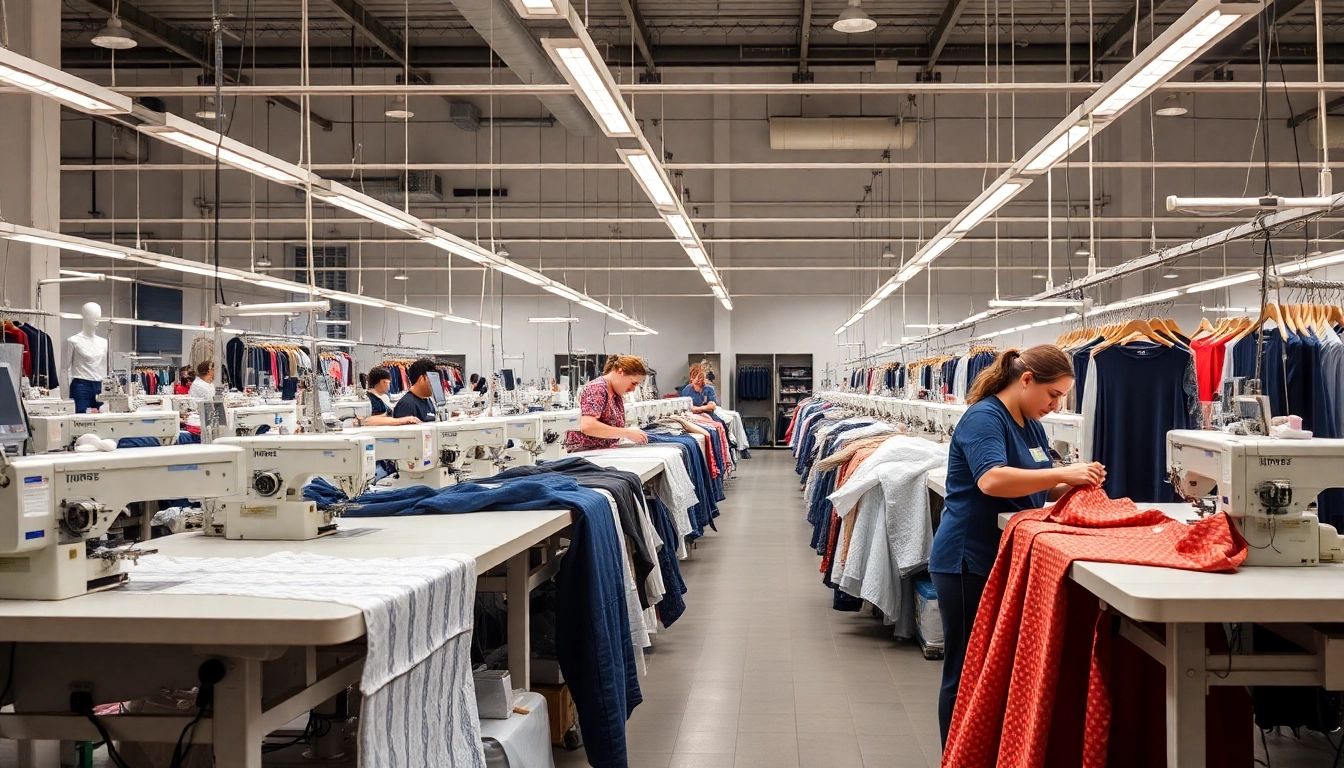Understanding the Critical Role of Clothing Manufacturers in the Fashion Landscape
In the dynamic world of fashion, the backbone of every apparel brand is rooted in the expertise and reliability of Clothing Manufacturers. These entities are responsible for transforming design concepts into tangible products, ensuring quality, efficiency, and cost-effectiveness. Whether you’re launching a local boutique or aiming to establish a global brand, understanding the multifaceted role of clothing manufacturers is essential for navigating the competitive apparel industry. This comprehensive guide explores the core functions, selection criteria, collaboration strategies, industry innovations, and performance metrics vital for building fruitful relationships with manufacturing partners.
What Do Clothing Manufacturers Do?
Clothing manufacturers are specialized entities that convert design ideas into finished apparel products. Their responsibilities span across several stages, including sourcing raw materials, pattern development, fabric cutting, sewing, finishing, quality inspection, and packaging. Essentially, these manufacturers serve as the operational engine that brings a fashion designer’s vision to life.
Beyond basic sewing, modern manufacturers often provide value-added services such as product development consulting, prototyping, sample creation, and compliance management. Their expertise not only ensures that designs are executed correctly but also optimizes production workflows to minimize costs and time-to-market. Many manufacturers now integrate sustainable practices, reflecting industry trends toward eco-conscious manufacturing methods.
Types of Manufacturing Services Offered
Manufacturing service offerings can vary based on the company’s specialization and client needs. Key types include:
- Cut-P fabrics and sewing: The traditional bulk production of garments based on established patterns.
- Private Label Manufacturing: Producing garments under a brand’s name, allowing brands to establish their identity without setting up their own factories.
- White Label Production: Creating generic apparel that can be customized with a retailer’s branding or labels.
- Sample and Prototype Development: Crafting initial samples to test designs before full-scale production.
- Full Supply Chain Management: End-to-end services, including sourcing raw materials, logistics, and distribution.
- Sustainable & Ethical Manufacturing: Focused on environmentally friendly processes and fair labor standards, increasingly demanded by conscious consumers.
Choosing the right type of service depends on your brand’s growth stage, budget, and product complexity. For startups, private label manufacturers offering low minimum order quantities (MOQs) are particularly attractive.
Key Benefits of Partnering with Professional Manufacturers
Collaborating with experienced clothing manufacturers offers numerous advantages:
- Cost Efficiency: Established manufacturers leverage economies of scale, reducing per-unit costs.
- Consistent Quality: Quality control protocols ensure products meet the designated standards, reducing returns and reputation damage.
- Faster Time-to-Market: Skilled manufacturers streamline production processes, enabling quicker delivery of new collections.
- Access to Innovation: Industry leaders stay abreast of textile advancements, sustainable processes, and technological innovations.
- Reduced Operational Burden: Outsourcing manufacturing lets brands focus on design, marketing, and sales.
For brands eyeing growth, these benefits translate into improved competitiveness and market responsiveness.
Choosing the Right Clothing Manufacturer for Your Brand
To ensure a successful partnership, meticulous evaluation of manufacturers is necessary. Here are critical factors to consider:
Evaluating Manufacturing Capabilities and Quality Standards
Examine the manufacturer’s technical competencies, machinery, and quality control measures. Review sample products, certifications (ISO, SA8000, etc.), and client testimonials. Visiting their facility or requesting factory audits can provide insight into their operational standards.
Considering Location, Lead Times, and Pricing
Proximity influences logistics costs and communication efficiency. Manufacturers in regions like Pakistan, Bangladesh, or China are popular for cost reasons, while proximity to your target markets can optimize delivery times. Obtain detailed quotes, considering material costs, labor, tariffs, and shipping expenses, to compare value accurately.
Assessing Experience and Industry Reputation
Partner with manufacturers who have a proven track record with similar product categories and order sizes. Industry reputation, client list, and longevity in the market serve as indicators of reliability and expertise. For instance, companies like ZK International or Axen Apparel in Pakistan demonstrate extensive experience in scalable apparel manufacturing.
Strategies for Effective Collaboration with Clothing Manufacturers
Building a productive relationship requires transparency, clear communication, and strategic planning:
Clear Communication of Design and Specifications
Provide detailed tech packs, sketches, fabric choices, sizing details, and labeling instructions. Employ visual aids and prototypes to minimize misunderstandings. Ensuring that both parties share a common language around technical specifications enhances accuracy.
Managing Production Timelines and Quality Control
Set realistic deadlines and milestones. Use quality monitoring tools, conduct regular inspections, and establish feedback loops. Prioritize quick resolution of issues to avoid delays and defective products reaching the market.
Building Long-term Partnerships for Growth
Consistency and trust form the foundation of enduring collaborations. Provide feedback based on performance, consider joint innovations, and negotiate price adjustments as order volumes grow. Long-term relationships often lead to better pricing, priority service, and collaborative product development.
Emerging Innovations and Industry Trends in Clothing Manufacturing
The apparel manufacturing sector is rapidly evolving through technological advancements and shifting consumer preferences:
Sustainable Materials and Eco-Friendly Processes
Materials like organic cotton, recycled polyester, and natural dyes are gaining prominence. Manufacturers adopting eco-conscious methods are not only reducing environmental impact but also appealing to increasingly sustainability-focused consumers.
Implementing Technology for Efficiency and Flexibility
Automation, CAD/CAM systems, and smart factory solutions improve production precision and reduce waste. Data analytics enable better demand forecasting, inventory management, and customization options.
Private Label and Custom Manufacturing Trends
Brands seek exclusivity and differentiation, turning to private label and OEM services. Customization options such as limited editions, eco-friendly collections, and personalized fits are shaping consumer expectations.
Measuring and Enhancing Your Brand’s Manufacturing Success
Performance metrics facilitate continuous improvement and strategic scaling:
Monitoring Quality and Cost Metrics
Track defect rates, lead times, and cost per unit. Use data to identify bottlenecks and negotiate better terms with suppliers.
Utilizing Feedback for Continuous Improvement
Collect customer reviews and internal assessments to refine designs and manufacturing processes. Iterative improvements sustain brand relevance and customer satisfaction.
Strategic Expansion of Production and Distribution
Scale production responsibly based on demand forecasts. Diversify manufacturing partners to reduce risks and optimize logistics for expanding markets.









